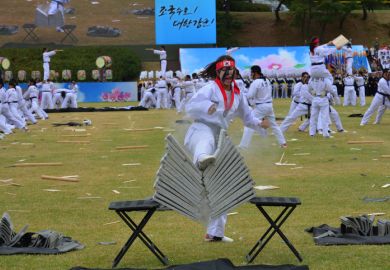With a diagnosis of myeloma, the author gambled. He chose not to have chemotherapy, and is still alive more than eight years later. It was quite a gamble - the chances of survival were about one in 20,000. It was a positive rather than a negative choice, to use breathing exercises, coffee enemas, the Gerson diet and acupuncture rather than conventional treatment.
The book begins with the best part, a whimsical account of the discovery of his illness and its impact on him, his friends and his life as a fellow of an Oxford college who teaches English. Somehow the impact is oddly muffled, the author looking through others' eyes. His encounters with doctors emphasise the clash between cultures, supposedly rational medicine meets those bred on a diet of treating "luxury" illness with the latest Sunday Times fad.
From then on it is downhill, and the problem is causality. It is dark outside and the streetlights are on. Therefore the streetlights made it go dark. The miracle is the author's survival without conventional treatment. His alternative regimen supported him through this time. He was in control of that aspect at least. But I do not have to believe that the regimen was the cure - the regimen was the supportive and reassuring streetlight.
Many, many pages are devoted to the reasons why the regimen was the cure. It is seriously selective and uncritical pseudoscience, and the measured words of the Mayo Clinic's Robert Kyle stand out. The simplistic implication is chemotherapy bad, carrots good. Simply untrue, for instance for many childhood leukaemias. Parents have to make decisions about treatment for their young child, or indeed about their own treatment with dependent others. The bad guys, the orthodox doctors, have to help with these awful decisions, and the central difficulty is communicating uncertainty. That difficulty comes through strongly in the book. Too easy, though, to condemn us all as bellowers and bullies. They exist in other professions too. We do fail at two levels. We fail to overcome the scientific illiteracy in the media. A 50 per cent increase in risk can be a 50 per cent increase in a tiny number, and therefore scarcely relevant. Any subsequent scare, stopping treatment, ducking vaccination, can have devastating consequences. We need the absolute risk increase, so that we can relate it to other risks we run happily, such as the 1 in 17,000 chance of dying in a road traffic accident in the UK in any one year. The second failure is at the individual level, patient to doctor. Professional advice from someone you do not like may be hard to take, but your bellower may be my saint. Shop around.
The obvious contrast to this book is John Diamond's C: Because Cowards Get Cancer Too . Diamond chose conventional treatment, lambasted alternative medicine, and died. Michael Gearin-Tosh chose not to have conventional treatment, sings the praises of alternative medicine, and survived. On this sample, should we abandon conventional medicine (doctors) in favour of unconventional (witchdoctors)? Diamond moved me, Gearin-Tosh did not. Diamond's account of his illness is direct and compelling. Both books have lessons for those who care for sick people, but perhaps the very fact of survival is less compelling than Diamond's epitaph.
Successful gambles are highlighted, failures are not. Lottery winners' success encourages others to play, despite the odds. That is the worry for me here. The author, in a very privileged position, chose to gamble and was successful. Many in less privileged positions may be encouraged to gamble, or at the very least will be encumbered with yet more guilt and difficulty in making their decisions. The book does succeed in engendering a voyeuristic fascination in how Gearin-Tosh reached his decision. The clash between a culture based on evidence and a culture based on belief shines through. This clash now invades so many parts of our lives, from genetically modified foods through to homeopathy, that it is hard to see how it will be resolved. May Gearin-Tosh (and I) survive to see the next instalments.
Henry McQuay is professor of pain relief, Oxford Pain Relief Unit, Churchill Hospital, Oxford.
Living Proof: A Medical Mutiny
Author - Michael Gearin-Tosh
ISBN - 0 7432 0677 0
Publisher - Scribner
Price - £14.99
Pages - 3
Register to continue
Why register?
- Registration is free and only takes a moment
- Once registered, you can read 3 articles a month
- Sign up for our newsletter
Subscribe
Or subscribe for unlimited access to:
- Unlimited access to news, views, insights & reviews
- Digital editions
- Digital access to THE’s university and college rankings analysis
Already registered or a current subscriber?



